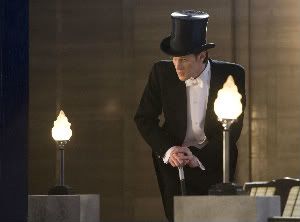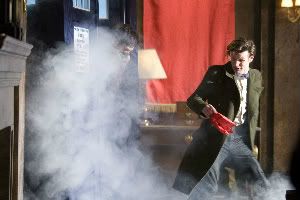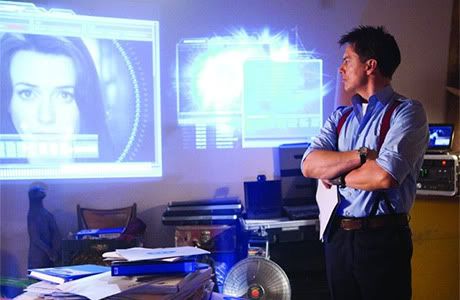Doctor Who: Let's Kill Hitler (review 2)

Doctor Who: Series Six - Let's Kill Hitler
Written by Steven Moffat
Directed by Richard Senior
Broadcast on BBC1 - 27th August 2011
This review contains plot spoilers and is based on the UK broadcast of the episode.
Under Russell T. Davies, Doctor Who found a new story type: the celebrity historical. This offered one way of promoting the show; the Doctor meets Charles Dickens, or Shakespeare, or Agatha Christie. An instant hook for critics and viewers. This series opener/midseries returner (delete as applicable) takes all the marketing chutzpah of the Davies era, and then has the guts to deliver something altogether different. Here, the conventions of the Davies-esque celebrity historical are firmly deconstructed. Adolf's not the point of the story, aligned with some evil, alien force as might be expected. No, because Hitler's shut in the cupboard, ridiculed and relegated to the sidelines. Storywise, it's all about the arc, not the Reich. Let's Kill Hitler is the suggestion of psychotic character Mels, never a serious statement of intent. Getting the high-concept marketing frills out of the way, Moffat's unbound and free to tell the story he's really interested in – 'The Beginning of River Song'.
Except Hitler-as-window-dressing is also thematically integrated into the tale; after all, his presence motivates the Teselecta and its hunt for war criminals. Following A Good Man Goes To War, we might ponder whether the Doctor himself is about to stand charge, but a storyline paralleling the Doctor and the Fuhrer was never going to secure any Brand Manager's assent. Instead, it's Melody Pond, Kovarian's weapon of choice, who seizes the Teselecta's interest and so narratively displaces Hitler.
Giving guilty parties hell, workers for the Justice Department have taken on a God-like status, able to cast definitive judgement and carry out sentencing. As the Doctor remarks, these miniaturised minions seem ever so certain of who they are. By contrast, Melody Pond's identity is fluid and insecure; post-Mels and yet pre-River, she's caught between selves, in a mixed-up state where regeneration energy can magically solve any crisis. The true crime of the Teselecta is to assume that identity is fixed, and that judgements can be final; by contrast, the Doctor doesn't judge, but instead proffers redemption, guiding Melody through the episode's rite of passage and into the mantle of River Song. Pond Junior doesn't have to be the object of Kovarian's scheming. She can be her own subject. She can choose life.
And yet one of the most important moments in the episode is withheld – an absence beating at the heart of all this quickfire fun. It's not The Question – though silence falls there too – but what the Doctor tells Melody to convince her that, as River Song, she can be so much more than her programming. This seems a bit of a cheat: the storyline requires the Doctor to say something hugely, emotionally affecting... so Moffat delivers the required outcome yet without the speech itself. Perhaps any possible dialogue could never have felt convincing enough; perhaps it's best left as a gap for fan speculation to play with. In any case, going beyond bananas and “spoilers!” this replays yet another Moffat-ism by recalling his previous use of such a device (in Forest of the Dead) where River whispers, unheard by us, the Doctor's name. Here again are the Doctor and River, sharing confidences, with this privacy maintaining the mystery of their relationship. Rather than delivering unadulterated sentimentalism, Moffat steps back and shrouds his protagonists' emotional lives just a little. Unlike Davies, this showrunner seems happier posing questions and constructing puzzles rather than delivering full-blooded emo-bombast. There's a curious reserve, or a discomfort, in relation to the big, predictable, plotted emotion. Or perhaps it's that, for Moffat, the Doctor and River's relationship is one of the show's current mysteries: this is emotion as narrative puzzle. No need to choose between character relationships and story arcs; they're all bound up in the same big wibbly ball of stuff.
And though the Teselecta may presume its own Godliness, Moffat throws in another fleeting metaphor: it's also a Star Trek-style crew rendered as a TV production team, complete with costume and art departments, the latter worrying about skin tone. Presumably this makes the Teselecta's captain a sort of showrunner, all key information at his fingertips, resolutely in charge of who's going to be given hell. Let's Kill Hitler thus makes crafty jokes about the showrunner-as-God, ridiculing authority just as it enacts it by setting out new mysteries and tidying away key incidents. We get the crowd-pleasing reversal of "spoilers!"; the first appearance of River's diary; and the beginnings of her archaeological career, as the Showrunner-God ticks all those boxes in rapid succession. Oh, and takes care to explain why River couldn't regenerate in Forest of the Dead, making fanboyishly sure that consistency is the mother of invention.
In the end, Let's Kill Hitler is a front for "Let's Find River", with the celebrity historical drawing audiences in for a story focused more strongly on the "TARDIS family" (Amy-Rory-River-Doctor) than ever before. This episode represents a Teselecta of showrunners; Moffat's finest shtick standing behind the eyes of a Davies era staple.


 As usual with Doctor Who, it is so easy to be taken along for the ride from beginning to end, and the cracks in the plot are easily plastered up by the sheer pace and display put on. One crack in particular that stuck out for me was quite how Mels ended up where she was. We see the young Melody regenerate into her at the end of Day of the Moon ... but this was in 1969(ish) and River says she only changed this once, so how did a young black girl get from New York City to Leadworth, not to mention being "born" at least couple of decades before her parents? Time Lords (should we call her that?) may age differently from humans, but then she seemed to match up with them rather well. Mind you, this could be a previously unknown facet of Time Lord physiology that they can control how they age (possibly borne out by an aside by River on getting younger tonight?).
As usual with Doctor Who, it is so easy to be taken along for the ride from beginning to end, and the cracks in the plot are easily plastered up by the sheer pace and display put on. One crack in particular that stuck out for me was quite how Mels ended up where she was. We see the young Melody regenerate into her at the end of Day of the Moon ... but this was in 1969(ish) and River says she only changed this once, so how did a young black girl get from New York City to Leadworth, not to mention being "born" at least couple of decades before her parents? Time Lords (should we call her that?) may age differently from humans, but then she seemed to match up with them rather well. Mind you, this could be a previously unknown facet of Time Lord physiology that they can control how they age (possibly borne out by an aside by River on getting younger tonight?).









